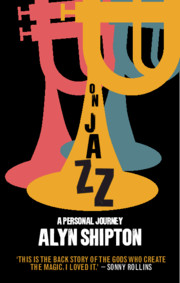Refine search
Actions for selected content:
3 results
Chapter 10 - Dizzy and Bird
-
- Book:
- On Jazz
- Published online:
- 31 March 2022
- Print publication:
- 05 May 2022, pp 144-156
-
- Chapter
- Export citation

On Jazz
- A Personal Journey
-
- Published online:
- 31 March 2022
- Print publication:
- 05 May 2022
Chapter 19 - Ellison’s Durational View of Bebop
- from Part II - Historical, Political, and Cultural Contexts
-
-
- Book:
- Ralph Ellison in Context
- Published online:
- 14 January 2022
- Print publication:
- 02 December 2021, pp 207-216
-
- Chapter
- Export citation
